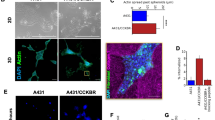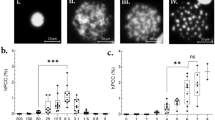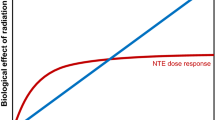Abstract
A PREVIOUS communication1 reported some quantitative data on the effects of continuous irradiation of HeLa cells grown as a monolayer. The incorporation of a suitable quantity of tritiated water in the growth medium provided a uniform source of radiation. An effect was noted with a dose-rate as low as 30 rads/day, when cells were repeatedly sub-cultured. Cells have now been exposed to such continuous irradiation for more than twelve months and this communication reports changes in the chromosome number of the continuously irradiated cells.
This is a preview of subscription content, access via your institution
Access options
Subscribe to this journal
Receive 51 print issues and online access
$199.00 per year
only $3.90 per issue
Buy this article
- Purchase on SpringerLink
- Instant access to full article PDF
Prices may be subject to local taxes which are calculated during checkout
Similar content being viewed by others
References
Nias, A. H. W., and Lajtha, L. G., Nature, 202, 613 (1964).
Nias, A. H. W., Gilbert, C. W., Lajtha, L. G., and Lange, C. S., Intern. J. Rad. Biol. (in the press).
Migeon, B. R., and Merz, T., Nature, 203, 1395 (1964).
Puck, T. T., and Marcus, P. I., J. Exp. Med., 103, 653 (1956).
Author information
Authors and Affiliations
Rights and permissions
About this article
Cite this article
NIAS, A., OCKEY, C. Change in Chromosome Number during Continuous Irradiation. Nature 206, 840–841 (1965). https://doi.org/10.1038/206840a0
Issue date:
DOI: https://doi.org/10.1038/206840a0



